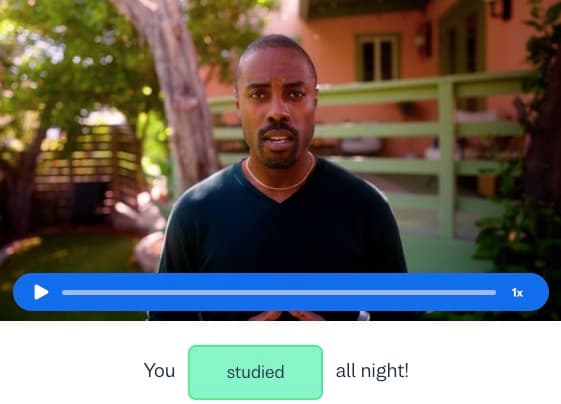I want to learn...
Effective methods are key to . And no method is more popular nowadays than language immersion. The natural and authentic way of learning a language is one of (if not the) most effective ways to learn a language. Many schoolchildren benefit from immersion schools. But adults can do it too — it just takes a little more work.
In this guide, you’ll learn all about language immersion, its benefits, and how to apply it to your own language learning.
What is language immersion?
Language immersion is a popular way of learning a language by immersing yourself in it. It’s more than turning up to class once a week, reading a book every now and then, or spending ten minutes on an app every day. You surround yourself with the language you’re learning.
Generally, to do language immersion you need to go to an immersion school or live overseas. But that’s easier said than done for many people (especially if you’re not a kid anymore). You can still do it — but you need to be creative. Find ways to interact with your new language in your daily life.
Benefits of language immersion
Language immersion improves everything to do with a language — the benefits of immersion education are huge. Your speaking, vocabulary, grammar, listening, writing, reading, and pronunciation all benefit. You also learn a ton about the culture of the language you’re learning.I wasn’t exaggerating when I said language immersion is the most effective way to learn a language. No other method gives such a comprehensive education.
Immersion programs and opportunities
If you’re lucky enough, there are some great opportunities for language immersion. Let’s take a look at the big ones.
1. Study abroad
Studying abroad has proven benefits for language learning. You get to learn language naturally through everyday interactions. You get to make friends from different cultures. You develop personally. And you don’t have to join specialty schools to enjoy it. You live your life in another country and language — it’s obviously not as simple as I’m making it sound. Living overseas is a huge challenge.
In terms of your language skills, it’s the ultimate language immersion experience. What could be better than trying out the Spanish you’ve been working hard on for two years while working part-time in a Madrid cafe?
But it goes beyond language learning. Studying abroad is a life-changing experience for many people. Your outlook, personality, and social circles all change. Who knows — you might never want to go back home.
2. Language immersion schools
Language immersion schools are exactly what they sound like — places for young people to get their education with the added twist of learning one or more new languages. Bilingual schools for example are becoming more popular in the USA with English and Spanish a common combination. By sending your child to a bilingual school, they get a standard education plus the benefits of language immersion.
Language immersion at home: Surround yourself with the language
But what if you’re not young to go to a bilingual school or lucky enough to take a year away from your responsibilities to study abroad? Well, you need to be more creative. You need to find ways to interact with your new language in your daily life. And you need to do this as much as possible.
This is the hardest — I’m not going to lie. Getting enough comprehensible input is the key to learning a language. When you live overseas, you receive input all day. When you take the train, for example, you hear people chatting, you read the advertisements, you listen to the announcements. This daily-life language is a great input because it isn’t too difficult — it’s comprehensible. You can understand it so you can learn from it.
When you study a language in your home country, you often read challenging texts or listen to complicated conversations. You spend time remembering words and trying to understand complex grammar structures. You think this will help you learn (and it will to an extent). But lots of easy-to-understand input is more effective.
The key to making language immersion work from your home is sourcing enough easy-to-understand input. Sure, watching Netflix can work (if you can understand it). Reading books is excellent (if you can understand them). But often books and TV shows are difficult to understand. You need a dictionary. You need to reread and rewatch. And you need time to analyze and understand what’s going on. That’s the opposite of comprehensible input.
Language immersion tips
The challenge for you is to find a way to surround yourself with easy-to-understand content from your new language. Here are some tips:
1. Stick to what you already know
There’s no need to reinvent yourself when you’re learning a language. Play to your strengths. Use the background knowledge you already have about something to help you understand the new language.
For example, imagine your hobby is basketball. You’ve played basketball your whole life. You watch most games of the basketball season. Your favorite Netflix shows are basketball documentaries. You’ve built up a huge amount of basketball knowledge over the years. You can talk and talk about basketball for hours.
Use this to help you learn a language — consume basketball content in your new language. Sure, maybe the words are different. But your vast knowledge of basketball makes it easy for you to guess the meaning from context. Content about basketball is more comprehensible to you than content about soccer, politics, or music because of your contextual knowledge. As an added bonus, you’re unlikely to get bored reading about basketball whatever the language.
2. Find graded content
Some language learning resources are designed to be easy to understand. How much of it is available depends on the language you’re learning, however. English for example has an unbelievable amount of graded content for language learners.
Graded readers are a popular and effective way to learn a language. Graded readers are edited versions of popular novels. For example, if you like mystery novels, you can find graded versions of Agatha Christie novels. They’re broken down into levels that usually correspond to the CEFR. Let’s say you choose a B1 Agatha Christie story. All the language that a B1 reader can’t understand is gone. In its place is a language a B1 reader can understand. It’s also much shorter. Sometimes they’ll include comprehension questions too — but these are optional.
Look around and see what you can find for your new language. Look for graded reading and listening materials. Find a suitable lesson and consume as much of that content as you can.
3. Build good habits
Language immersion isn’t a magic bullet that makes you fluent overnight. It’s consistent exposure to your new language for a period of time. Consistent is the key word here. You need to be doing something in your new language every day.
Every day sounds daunting — especially if you set yourself ambitious goals like two hours every day — but there are ways of making it manageable and sustainable. Little and often is a great way to be consistent. Set yourself a manageable target like 20 minutes per day to start. When that habit is solid, start studying longer and longer each day.
Be flexible with your plans too. If you’re too rigid, it’s easy to lose motivation. Life happens so roll with the punches. Setting overly ambitious study targets can do more harm than good. Add short times throughout each day when you interact with your new language.
Immerse yourself in your new language for best results
Language immersion is one of the most effective ways to learn a new language. By surrounding yourself with comprehensible input, you learn a language naturally. It isn’t easy to do when you’re in your home country, but it isn’t impossible. You need to create opportunities to interact with your new language.
The two keys are input and consistency. You need input you can understand and you need it consistently. Find resources related to things you already know well — like your hobby or job — and use them every day. Set yourself achievable daily study targets. Start off slowly and build it up so you don’t burn out. You can master any language you choose through language immersion. Even if you never leave home.
AUTHOR

Barney Meekin
Newlanguages


